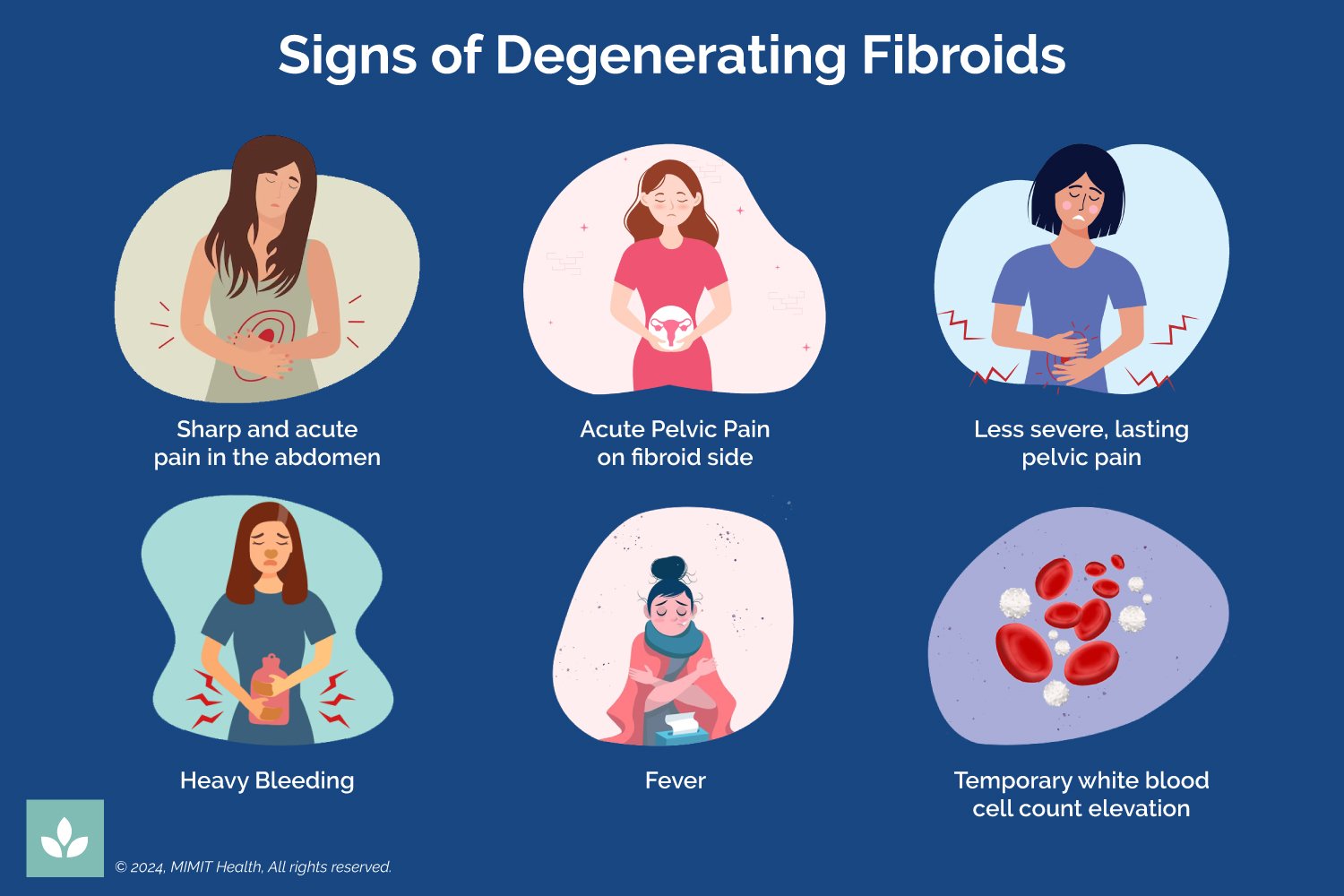Fibroid Degeneration
Fibroid degeneration occurs when a fibroid receives inadequate blood supply. The fibroid undergoes degeneration, gradually shrinking to a size that can be sustained by the current blood flow.
What are fibroids?
Fibroids are non-cancerous tumors that develop inside or on the muscular walls of the uterus. A woman is most likely to develop them from her early 20s and into her 40s and even 50s at times. Up to 80% of women will develop fibroids, although symptoms aren't always present.
Symptoms of fibroids include:
Pain during intercourse
Anemia due to heavy bleeding
Lower abdominal pain/swelling, which can be mistaken as weight gain or pregnancy
Frequent urination
Difficulty emptying the bladder
Constipation
Backache or leg pains
Also referred to as leiomyomas or myomas, fibroids vary in size and can range from almost undetectable to the size of a grapefruit, which can then distort the shape of the uterus. These growths can cause pain, heavy menstrual bleeding, and discomfort during intercourse, leading to a significant impact on a woman's quality of life. While the exact cause of fibroids is unknown, factors such as genetics, hormones, and age may contribute to their development.
As you receive treatment for fibroids, such as uterine fibroid embolization, it's important to pay attention to signs of fibroids breaking down. It can be a painful
If you're experiencing any pain related to fibroids, please schedule an appointment with us to discuss it with our fibroid specialists.
What is fibroid degeneration?
Fibroid degeneration can occur when the fibroids outgrow their blood supply, causing the tissue to die and become twisted or calcified. When a fibroid receives an inadequate blood supply, it undergoes degeneration, gradually shrinking to a size that can be sustained by the current blood flow. However, this shrinking is often not permanent, as fibroids tend to grow back to their original size, restarting the cycle and causing uncomfortable and sometimes debilitating symptoms. The pain experienced during fibroid degeneration can range from a few days to a few weeks. As long as there is a blood supply to the fibroid, this cycle can continue.
What are the symptoms of fibroid degeneration?
The symptoms of degenerated fibroids can catch a woman off guard, as they are more severe and include sudden, sharp abdominal pain that is often localized to one side or quadrant of the pelvis, as well as abdominal swelling and bloating.
Pelvic pain/abdomen pain accompanied by swelling
Abdominal swelling
Fever
Increased urination
Bleeding
While the symptoms of fibroid degeneration can be uncomfortable, treatments are available to help alleviate the pain and discomfort.
Is fibroid degeneration a good thing?
Fibroid degeneration might sound good because a fibroid is shrinking in size, but it's not a sign of your fibroids going away for good. It's important to see a fibroid specialist at MIMIT Health for any painful symptoms related to fibroids.
Do degenerating fibroids need to be removed?
Until you talk with a specialist, it's difficult to say for certain. However, removing degenerating fibroids can provide relief and improve quality of life for those experiencing discomfort.
Does the location of your fibroid(s) matter with degeneration?
Intramural fibroids
Nestled within the uterine wall muscles, these fibroids can disrupt uterine function. Remarkably common, accounting for 70% of all uterine fibroids, they affect approximately one in four women of childbearing age.
Submucosal fibroids
Submucosal fibroids project into the uterine cavity, nestled underneath the uterine lining. Women with this type may experience heavy bleeding during their menstrual cycles and heightened abdominal pain.
Subserosal fibroids
These fibroids tend to grow on the outside of the uterine walls, affecting nearby organs. As a result, they can exert pressure on the bladder, bowels, and abdomen, causing discomfort and complications.
Pedunculated fibroids
Suspended by delicate threads or stalks within or outside the uterus, these fibroids can obstruct the uterus and surrounding organs, leading to abdominal pain.
Explore the fascinating connection between fibroid location and its impact on overall well-being.
Pregnancy and degenerating fibroids
During pregnancy, fibroids can grow rapidly due to the increase in hormone levels and blood supply to the uterus. However, in some cases, fibroids may start to degenerate during pregnancy, causing considerable pain and discomfort. Although it is not entirely clear why some fibroids degenerate during pregnancy, research suggests that it could be due to the rapid growth and development of the uterus. However, the good news is that fibroid degeneration is not harmful to the baby, and it rarely leads to complications during pregnancy.
Related: Fibroids and pregnancy
Fibroid degeneration treatment
Uterine fibroid embolization (UFE)
A degenerating fibroid can be a painful and worrisome condition, but there is relief available through uterine fibroid embolization. This treatment targets the blood supply to the fibroid, gradually shrinking the tissue until it disappears. Unlike surgery, embolization involves only a small incision and has a much shorter recovery time. This minimally invasive procedure has been proven effective in treating degenerating fibroids and giving women relief from the associated discomfort. If you are experiencing symptoms of a degenerating fibroid, consider speaking with your doctor about the benefits of uterine fibroid embolization.
Dr. Paramjit “Romi” Chopra, interventional radiologist and fibroid expert
Living with fibroids
Diet and exercise
Daily exercise is vital for everyone, not just those with fibroids. Aim for 30 minutes every day doing activities like walking or yoga. In terms of diet, ensure you're following a natural fibroid care plan—one that focuses on vitamin D, omega-3 fatty acids, and iron.
UFE Support Group
Join this women-led group on Facebook where members can ask questions, get advice, and more when it comes to uterine fibroid embolization.




